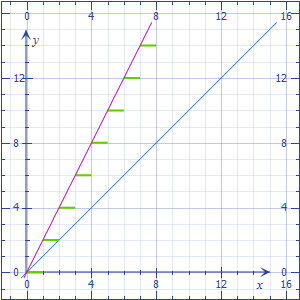I'm trying to prove that $f \in \mathcal{O}(\lfloor f \rfloor)$ given that $\forall m \in \mathbb{N}, f(m) \geq 1$
Here's what I've thought of so far, we can set C = 10 and k = 1 and somehow prove that this would eventually dominate the function? Not sure how I can prove this without a concrete function defined for $f$
According to the definition of big O, 
For any C larger than 1, C times floor of f would eventually dominate f. What I can't figure out is how to outline this in a formal proof. Any help is appreciated!

